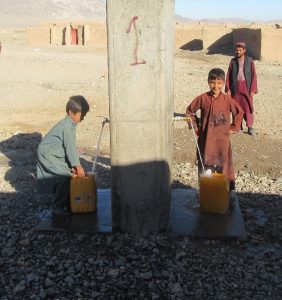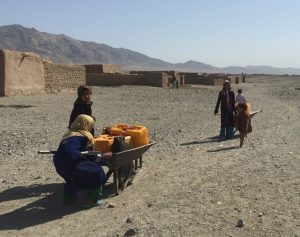Now Sanam’s Family Has Access to Clean Water- Story From Herat
STORY HIGHLIGHTS
- Maslakh’s Internal Displacement People (IDP) families finally got access to clean drinkable water
- Community established Community Development Councils (CDCs) and agreed on project on clean drinkable water as their priority.
- Now Maslakh water supply network has 273 stand taps, each tap is serve to 10-20 families. A total of 19,350 people now have access to clean and drinkable water.
- “Local Integration of Vulnerable Excluded & Uprooted Programme” (LIVE- UP) is funded by European Union, with technical support of UN- Habitat. The programme aims to provide support to IDPs in three strategic Afghan cities located in Kabul, Herat and Nangarhar provinces.
Maslakh is located at the West side of Herat city, 15 km away from the downtown. According to the midline survey conducted by UN- Habitat on the middle of December 2016, about 4,833 families living in Maslakh who originate from Faryab, Badghis, Ghor, and Daykundi.
In Maslakh has been deprived of most basic services, and lack of drinkable water was the most severe problem. Maslakh is a dry place in the foot of the mountains hence the water level is very low. The people could not dig wells by themselves. There were a few wells in Maslakh but they were severely polluted with the dust, insects, animal feces and surface water, and caused various diseases especially for children.
Miss Sanam, one of the residents in Maslakh, says “the land is rough; the stone pieces prevent me from walking around easily. I had a handbarrow in my hands, which was full of mall barrels. There were my children too, who followed me with bare feet and torn clothes. I always tried to walk faster, but the rough path held me back. I had to pass a long distance to reach the well. Sometimes I could not get water because there was not enough water in the well. Because there is one well for more than 30 families and I need to wait for my turn I would spend 20-30 minutes every time I went to collect water.”
“Before establishing these water supply networks we did not have access to enough water for washing and drinking and the well broke frequently. At least once a month it broke, and we had to pay to fix it. On a cold winter day, the well near to our house broke and our neighbors did not have money to fix it. Due lack of potable water, I sent my son to bring water which belonged to another area. However, they did not allow my son to collect water, and they treated with him very badly. There was always the same story of not letting outsiders take water from one’s own well. So many times conflict arises among families on water collection as everyone was trying to secure water for themselves”.
“In the past, we spent a long time collecting a barrel of water, but now we can get water in few minutes from nearest stand tap. The water pump is a great facility for us. This water is clean and tasty and my children will not get sick anymore”.
Under Local Integration of Vulnerable Excluded & Uprooted Programme”(LIVE- UP), five water supply networks have been installed in five CDCs in Maslakh, with a standard piping system to supply all families with water. In total 273 stand taps are located in different places throughout in this settlement. Each stand tap belongs to 10-20 families, giving a total of 19,350 people access to clean and drinkable water.
LIVE-UP, funded by European Union with technical support of UN- Habitat, aims to provide support to IDPs in three strategic Afghan cities located in Kabul, Herat and Nangarhar. The project uses lesson learned from the previous projects (EU funded) and the experience of UN- Habitat in identifying and lobbying for durable solutions through local integration of IDP households.


